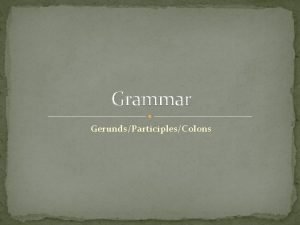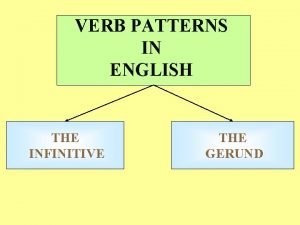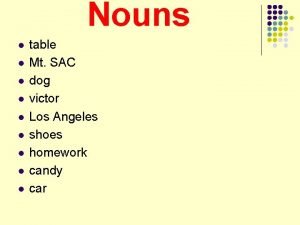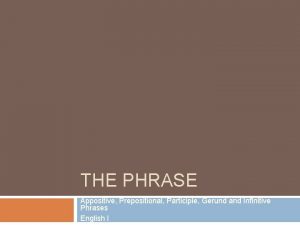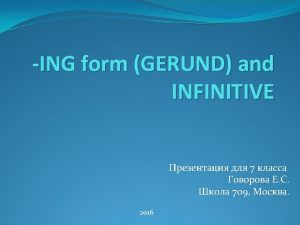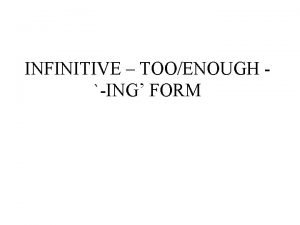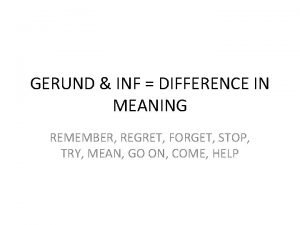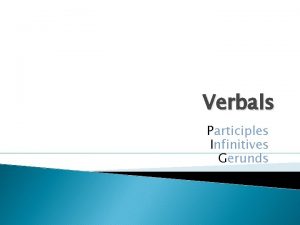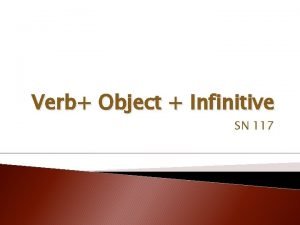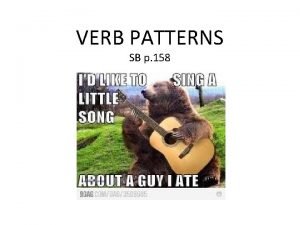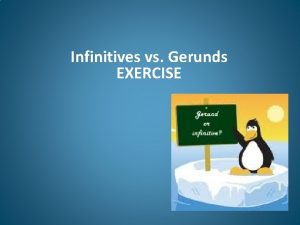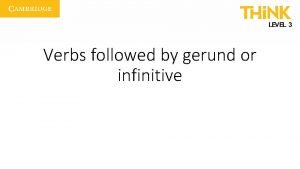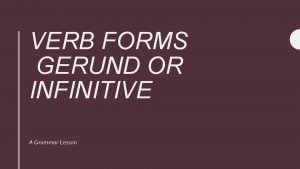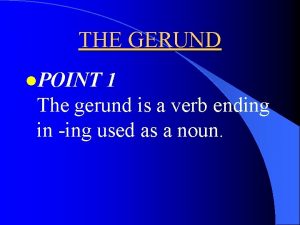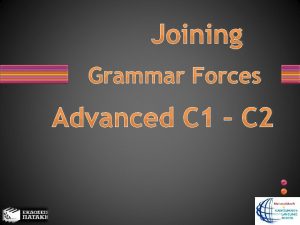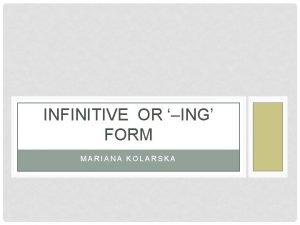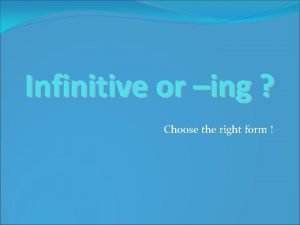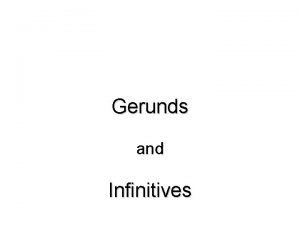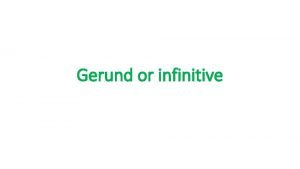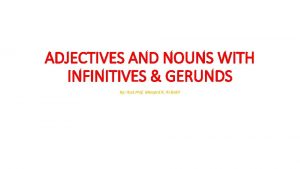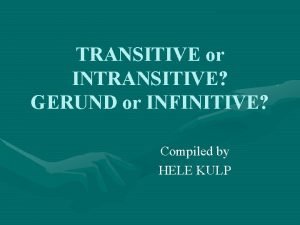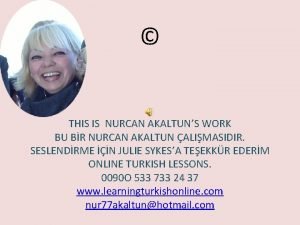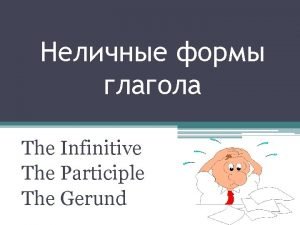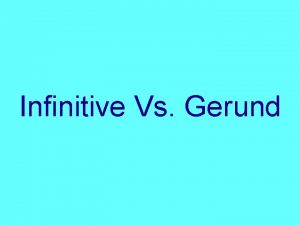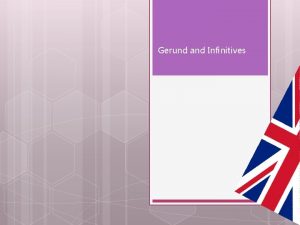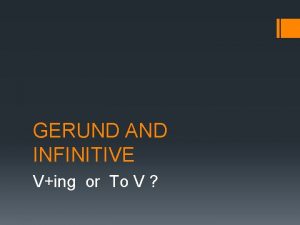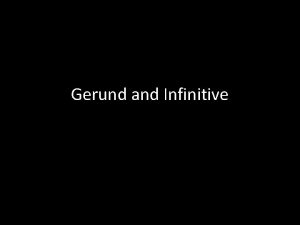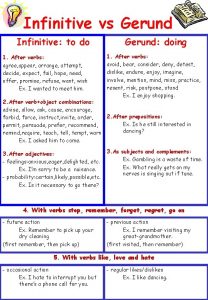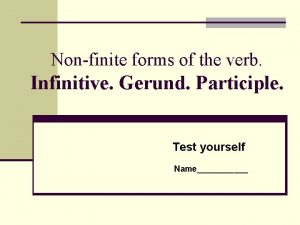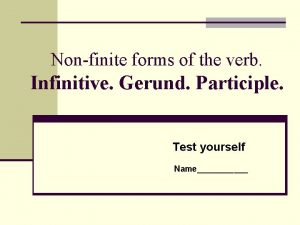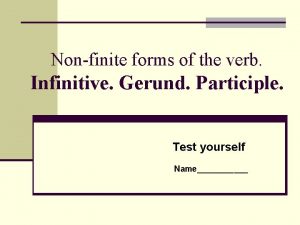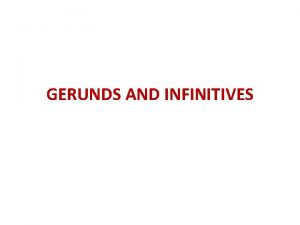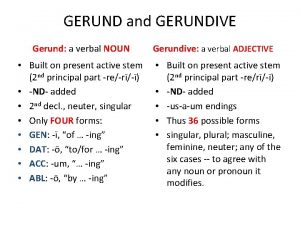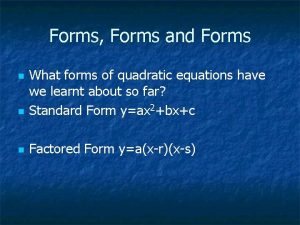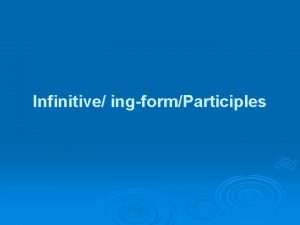Gerund and Infinitive Forms of the Infinitive Active

































- Slides: 33

Gerund and Infinitive • • • Forms of the Infinitive Active Voice Present (to) play Pres. Cont. (to) be playing Perfect (to) have played Passive Voice (to) be played xxxxx (to) have been played • Perf. Cont. (to) have been playing xxxxxx • * Passive Present Continuous and Perfect Continuous Infinitives are rarely used.

• Forms of the -ing form • Active Voice • Present playing • Pres. Cont. xxxxxxx • Perfect • perf. Cont. • • • Passive Voice being played xxxxxx having played having been played xxxxxxxxxxxxxxx Forms of the infinitive corresponding to verb tenses Verb tenses Forms of the Infinitive Present Simple/Future Simple Present she cleans/she will clean (to) clean Present Continuous/Future Continuous Present Continuous she is cleaning/she will be cleaning (to) be cleaning

• Past Simple/Present Perfect/Past Perfect/Future Perfect • she cleaned/she has cleaned/she had cleaned/she will have cleaned • (to) have cleaned • Past Continuous/Present Perfect Continuous/Past Perfect Continuous/Future Perfect Continuous • she was cleaning/she has been cleaning/she had been cleaning/ • she will have been cleaning • exercises • • 1. she finished. . . (to) have finished. . . 2. he was driving. . . . . 3. it has been taught. . . . . 4. they had come. . . . . Perfect Continuous (to) have been cleaning

• • • 5 she tries. . . . . 6 it is brought. . . . . 7 they are studying. . . . . 8 it will be accepted. . . . . 9. it was written. . . . . 10 she has left. . . . .

• Correct Form of the Infinitive • 1. I've looked everywhere, but the file appears. . . to have been misplaced. . . (misplace). • 2. He is not old enough------- (allow) to stay out late. • allow • 3. Since her illness she seems ---- (find) work difficult. • find • 4. Although Jane hopes ---- (invite) to the embassy dinner, it is unlikely that she will be. • invite • 5. The little dog seems ----- (lose) its master. • Lose • 6. I don't think I'll be able to make it tomorrow. I'm supposed. . . . (meet) Jane for lunch. • meet

• 7. She was only pretending. . . (read); she was really daydreaming. • read • 8. No one is. . (admit) to the concert without a ticket. • admit • 9. The team is said. . (win) the match through luck. • Win • 10. I need you. . (help) me prepare the food for the party. • help • 11. The accident is believed. . (cause) by reckless driving. • Cause • 12. The newspaper received many calls from people claiming. . . (see) UFOs. • see

• 13. He was the first British writer. . . (award) the Nobel prize for literature. • award • 14. Aren't you supposed. . . . (look after) your sister at the moment? • Look after

• The to-infinitive is used • to express purpose. • You should take a few days off to recover. • after certain verbs (agree, appear, decide, expect, hope, plan, promise, refuse etc). • He agreed to meet us tonight. • after certain adjectives (happy, glad, sorry etc). • I was sorry to hear about your accident. • after I would like/would love/would prefer to express specific preference. • I'd love to visit India. • after certain nouns. • It's such a pleasure to be with you.

• • • after too/enough constructions. It's too early to leave the party. He's rich enough to afford a Porsche. There's enough food to go round. with: it + be + adjective (+ of + noun/pronoun). It was unkind of her to say that. with: so + adjective + as. Would you be so kind as to pass the sauce? with "only" to express an unsatisfactory result. He won in the lottery only to lose at the casino. after: be + the first/second etc/next/last/best. • She was the first to congratulate him.

• in the expression: for + noun/pronoun + to -inf. For • John to tend you his car was very unusual. • in expressions such as: to tell you the truth, to begin with, to be honest etc. • To be honest, I didn't know how to react. • Note: If two infinitives are joined by "and" or "or", the "to" of the second infinitive can be omitted. • I'd prefer to go to a disco and dance or talk to my friends.

• The -ing form is used: • • as a noun. • Smoking is harmful. • after certain verbs (admit, anticipate, appreciate, avoid, consider, continue, delay, deny, discuss, enjoy, escape, excuse, fancy, finish, forgive, go (physical activities), imagine, involve, keep (= continue), mention, mind, miss, object to, postpone, practise, prevent, quit, recall, recollect, report, resent, resist, risk, save, stand, suggest, tolerate, understand etc). • They have postponed moving house till next week. • after: dislike, enjoy, hate, like, love, prefer to express general preference. • I like swimming, (in general) • * Note: like + to-inf = it's a good idea, . • I like to help people.

• also specific idea ; I like to cook spagetti on Fridays evenins. But, ’I like cooking. ’(in general) ` after: I'm busy, it's no use, it's (no) good, it's (not) worth, what's the use of, can't help, there's no point (in), can't stand, have difficulty (in), in addition to, as well as, have trouble, have a hard/difficult time. • There's no point in arguing. • What's the use of crying? It was your fault. • after: spend/waste (time, money etc). • You waste too much time watching TV. • • after prepositions. • He became rich by working hard and without borrowing from anyone.

• • after: look forward to, be/get used to, be/get accustomed to, object to, admit (to) etc • I object to being told what to do with my life. • I am used to speaking in front of students. • after: hear, listen, notice, see, watch to express an incomplete action, an action in progress or a long action. • I saw him throwing rubbish out of the window. (I saw part of the action. I didn't wait until he had finished. Perhaps he threw more rubbish. ) • BUT: hear, listen, see, watch + infinitive without "to" express a complete action, something that one saw or heard from beginning to end. • I saw him throw rubbish out of the window. (I saw all of the rubbish being thrown out of the window. ) • Did anybody see him break the window? • Can you hear them singing in the lesson?

• • • The infinitive without to is used • after most modal verbs (can, could, may etc). He can go if he wants to. • after had better/would rather/would sooner. You'd better go to bed. • after make/let/see/hear/feel in the active. She made the baby eat all his soup. But in the passive: be made/be heard/be seen + to-inf. The baby was made to eat all his soup. Note that "let" turns into "was/were allowed to" in the passive. Her parents let her stay out till midnight. She was allowed to stay out till midnight.

• Fill in the blanks with the correct form of the infinitive or the -ing form. Mind the tenses • 1. The police made the bank robbers. . . give. . . (give) themselves up. • 2. He is not likely ------ (return) before five o'clock. • To have returned / to return • 3. The criminals were forced. ----- (surrender). • To surrender • 4. They might not---- (complain) about the meal if the service hadn't been so dreadful. • Have complained • 5. Man is said ------- (invent) the wheel about ten thousand years ago. • To have invented

6 You must------ (starve) to have eaten such a big dinner last night. • Have been starving 7 She'd better------- (have) a good excuse for being so late. • have • 8 They hope -------(make) a lot of money in their new business. • To make • 9 The wind tends ----. (increase) just before sunset. • To increase Ó He should ------(tell) his parents the truth when they asked him. • Have told • 11 Imagine ---- (live) in a big house like that! • living

• • • 12. I'd rather not-----(visit) my parents this weekend. visit 13. She's too tired -----(concentrate) on her work today. To concentrate 14. You should ------- (see) his face when she told him the news. Have seen 15. It was such a shock ---- (hear) from her after all these years. To hear 16. Ann would love ------- (lie) on a beach now, instead of typing reports. • To be lying • 17. The doctor worked for fifteen hours without----- (take) a break. • taking

• 18. John's father let him ------- (borrow) his car for the weekend. • borrow • 19. There's no point---- (get) there early, because the gates don't open till 10 am. • getting • 20. Jim doesn't have enough patience ----- (be) a teacher. • To be • xxxxxxxxxxxxxxxxxxxxxxxxx • Fill in the blanks with the correct form of the infinitive or -ing form. • Whatever else Christmas may 1). stand for. (stand for), one thing it still means is 2). . . (eat). • Eating

• Christmas has traditionally been a time of the year when people have tried 3) ------ (cheer) themselves up during the cold months of winter. • To cheer • Last year more than 10 million turkeys were bought in Britain alone during the festive season 4) ------- (satisfy) the nation's appetite. • To satisfy • Health experts may continue 5) ----- (complain) about all this self-indulgence, but they fail 6) ------ (realise) that there is nothing new about celebratory feasting, particularly at this time of year. • Complaining / to complain -- to realise • The Roman Saturnalia, which was supposedly a festival 7) ------ (honour) the god of agriculture, started on 19 December.

• People who had spent the whole year 10) ----- (save) money suddenly became extravagant. • Saving • In addition to 11) ----- (exchange) gifts, this time of year was also an occasion for masters and slaves alike 12) ------ (eat) excessively. • Exchanging ---- to eat • At one Saturnalia feast an emperor is reported 13) -----(spend) the equivalent of £ 600, 000 on a dinner for twelve guests which consisted of twenty courses and lasted all day. • To have spent • So, when mealtime comes round on 25 December, there's no point in 14) ------- (have) a guilty conscience. • Having • In fact the occasional seasonal feast may promote good health and stop year-round 15). . . (overeat). • overeating

• Put the verbs in brackets into the -ing form or the infinitive with or without ‘to’. • When Gilbert decided 1). . . to give up. . . (give up) his job and 2) ----- (sell) all his possessions, everyone thought he was mad. • Sell • But, as it turned out, he was just the first of many of my friends 3) ----- (do) this. • To do • In fact, escaping the pressures of everyday working life has become a priority for many people these days. They can't stand the idea of 4). . . . (work) until they are 65, • working • only 5). . . . (retire) to some boring country village and 6). . . (waste) their time 7). . . . . (dig) the garden or 8). . . (gossip) with the neighbours. • To retire, --- waste, --- digging, --- gossipping

• They would rather 9) ---- (live) life to the full now before they are too old 10)---- (enjoy) it. • live , --- to enjoy • 11) ----- (buy) a motorcycle and 12) ----- (tour) the world is a popular option. • buying / to buy, --- touring / to tour • Other, less adventurous types might prefer 13) ---- (buy) a small farmhouse and live off the land. • to buy • Personally, I fancy 14) ---- (sail) around the world in a yacht. • sailing • As for Gilbert, he bought a house in a little country village and spends his time 15) ---- (walk) around the village and 16) ------(talk) with the neighbours. • walking, ----- talking

• Put the verbs in brackets into the -ing form or the infinitive without to. • 1. I watched her. . . get up. . . (get up) and walk slowly out of the room. • 2. I heard the phone ------ (ring) twice and then stop. • ring • 3. Tim saw Jill ------ (stand) outside the butcher's as he was driving to work. • standing • 4. Jane stopped to watch the river ------ (flow) down the mountainside. • flowing • 5. Listen to the wind ------ (blow) through the trees. • blowing

• 6. We heard the workmen ----- (drill) in the road as we were eating breakfast. • drilling • 7. The witness saw the burglar ----- (break into) the house and steal the television. • break into • 8. Listen to her ----- (sing) the song and then tell us what you think of it. • sing

• Verbs taking to-infinitive or -ing form without a change in meaning • begin, continue, intend, start + to-inf or -ing form. We don't normally have two -ing forms together. • • He began speaking/to speak, not: He is beginning speaking. advise, allow, encourage, permit, require + object + to-inf. She doesn't allow them to talk in class. advise, allow, encourage, permit, require + -ing form She doesn't allow talking in class. be advised, be allowed, be encouraged, be permitted, be required + to-inf. • They aren't allowed to talk in class.

• need, require, want + to-inf. /-ing form/passive int • You need to wash the car. • Your car needs washing. • Your car needs to be washed. • Complete the sentences using the words in bold. Use two to five words. • • 1. We weren't advised to book in advance. advise They ------- book in advance. didn't advise us to 2. You really need to renew your passport before you go on holiday. • needs Your passport -------- before you go on holiday. • Really needs renewing / to be renewed

• 3. They require hotel guests to vacate their rooms by twelve noon. • • are Hotel guests -------- their rooms by twelve noon. Are required to vacate 4. The dietician advised us not to eat between meals. eating The dietician ------ between meals. Advised not eating / us to avoid eating 5. They need to consider the proposals more carefully. considered The proposals ------ more carefully. Need to be considered

• Verbs taking to-infinitive or -ing form with a change in meaning • • 1. a) forget + to-inf (= forget to do sth) He forgot to switch off the TV. b) forget + -ing form (= forget a past event) I'll never forget meeting Jane for the first time. • 2. a) remember + to-inf (= remember to do sth) • I hope you'll remember to tidy your room. • b) remember + -ing form (= recall a past event) • I don't remember him ever tidying up his room. • 3. a) mean + to-inf {= intend to) • She means to start a new life. • b) mean + -ing form (= involve) • I won't take the job if it means moving to Scotland.

• 4. go on + to-inf (= finish doing sth and start doing sth else; then; afterwards) • She finished one letter and went on to write another. • go on + -ing form (= continue) • She went on writing till the early hours of the morning. • 5. regret + to-inf (= be sorry to) • I regret to inform you that your services are no longer required. • regret + -ing form {= have second thoughts about sth already done) • He regrets misbehaving. • 6. would prefer + to-inf (specific preference) • I’d prefer to see you in private. • prefer + -ing form (in general) • I prefer working on my own.

• prefer + to-inf + rather than + inf without to • He prefers to paint the flat on his own rather than hire a professional. • 7. try + to-inf (= do one's best; attempt) • Try to eat less high-cholesterol food. • try + -ing form (= do sth as an experiment) • Try cutting down on fat. You might get thinner. • 8. want + to-inf (= wish) • I want to stop smoking. • want + -ing form (= sth needs to be done) • This room wants tidying up. • 9 stop + to-inf (= pause temporarily) • He stopped at the garage to have the tank filled. • stop + -ing form (= finish; cease) • He stopped behaving foolishly.

• • • 10. a) be sorry + to-inf (= regret) I'm sorry to tell your flight has been cancelled. b) be sorry for + -ing form (= apologise for) He was sorry for hurting her feelings. 11. a) hate + to-inf (= hate what one is about to do) I hate to cut in, but you must see the manager. b) hate + -ing form (= feel sorry for what one is doing) I hate causing you so much inconvenience. 12. a) be afraid + to-inf (= be too frightened to do sth; hesitate) • She was afraid to climb the tree. • b) be afraid of + -ing form (= be afraid that what is referred to by the -ing form may happen) • When she goes swimming, she's always afraid of being stung by jellyfish.

• Put the verbs in brackets into the -ing form or the infinitive. • 1 A: Oh, Mum, this programme's nearly finished. Can't I go on. . . watching. . . (watch) TV for a while? • B: No, I want you to do your maths homework and then go on ----- (write) your English essay. You haven't even started it yet and it's due in tomorrow. • To write • 2 A: Your dress is filthy. It wants ------. (wash). • B: . I know. I wanted ------ (take) it to the cleaner's yesterday, but they were closed. • Washing -- to take • 3 A: Don't you hate ------ (not/know) anyone here? • B: Yes, I get very lonely, but I hate ---- (worry) my parents so I tell them I've made lots of friends. • Not knowing -- to worry

• 4. A: I'll never forget ---- (visit) Thailand for the first time. • B: Yes, it was such a wonderful holiday. If only I hadn't forgotten ----- (take) my camera. • Visiting -- to take • 5 A: Why don't we stop ----- (get) something to eat on the way home? • B: OK, but we should really stop ----- (spend) money on junk food. • To get -- spending • 6 A: I'm sorry for------ (spoil) your plans last weekend. • B: That's OK. I was sorry ----- (hear) you weren't feeling very well.
 Infinitive active and passive voice examples
Infinitive active and passive voice examples What are gerunds
What are gerunds Ing gerunds
Ing gerunds How to identify a gerund phrase
How to identify a gerund phrase Gerund phrases practice
Gerund phrases practice Verb+ noun examples
Verb+ noun examples Acknowledge gerund or infinitive
Acknowledge gerund or infinitive Gerund and infinitive story
Gerund and infinitive story Esl gerunds and infinitives
Esl gerunds and infinitives Verb patterns: object + infinitive
Verb patterns: object + infinitive Possessive gerund
Possessive gerund What is an infinitive
What is an infinitive Participle gerund and infinitive
Participle gerund and infinitive Ing and drinking
Ing and drinking Can't bear to or ing
Can't bear to or ing Delighted gerund or infinitive
Delighted gerund or infinitive Regret gerund
Regret gerund Sleep gerund or infinitive
Sleep gerund or infinitive Verb + object + to infinitive
Verb + object + to infinitive Voorzetzels
Voorzetzels Verb patterns help
Verb patterns help Remind gerund or infinitive
Remind gerund or infinitive Verbs followed by gerund
Verbs followed by gerund Accuse gerund or infinitive
Accuse gerund or infinitive Point gerund or infinitive
Point gerund or infinitive Force gerund or infinitive
Force gerund or infinitive Ing
Ing Choose to or ing
Choose to or ing Infinitives can function as
Infinitives can function as Verb+ ing
Verb+ ing Anxious gerund or infinitive
Anxious gerund or infinitive Congratulate gerund or infinitive
Congratulate gerund or infinitive Hem gerund hem infinitive alan fiiller
Hem gerund hem infinitive alan fiiller Gerund infinitive participle
Gerund infinitive participle




